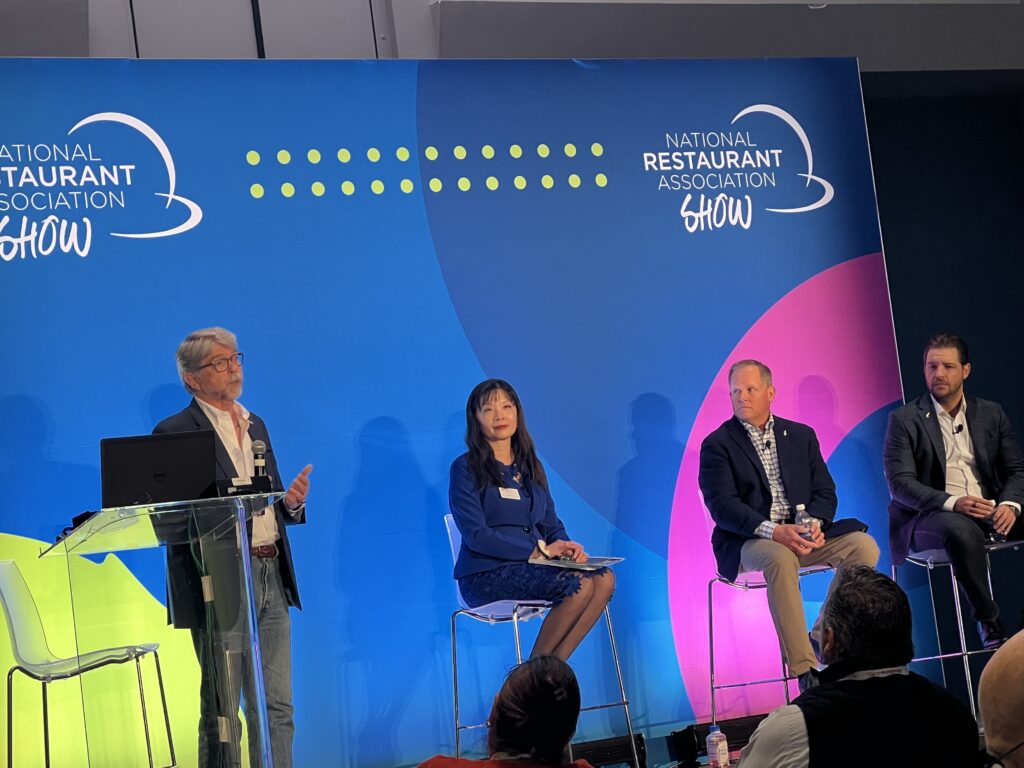While it may seem that AI and robotics have infiltrated many aspects of restaurant operations, the truth is that the hospitality industry is still in the early stages of implementation. In fact, according to recent data from the Nation's Restaurant News Intelligence Tech Market Leader report, 63% of operators do not currently use AI.
At the National Restaurant Association Show in Chicago, experts and operators explored questions and challenges about AI and robotics during the educational session “Revolutionizing Hospitality: The Journey of AI and Robotics to Enhancing Guest Experiences?” Internet connectivity.
“I can tell you what keeps me up at night — losing the Internet,” Bob Shallow, senior vice president of Diversified Restaurant Group, said during the panel discussion. “When I lost the Internet, I lost the ability to run my restaurant. Back in the day, we only had cash registers, but the fact is, when I lost the Internet, I lost my restaurant. So Now we are trying to get it and move forward.
Apart from losing internet connectivity, there are some current constraints and limitations that were discussed.
Fear of displacement of employees
With conversations about AI and automation, the topic of employee turnover will eventually come up: If you have voice AI in the drive-thru lane, do you even need employees wearing headsets? If you have phone answering kiosks, QR codes, and AI, do you really need that much effort in the front or back of the house?
“When we first turned on AI ordering, we had guests asking if we had eliminated a position in the restaurant and were afraid to lay off employees, but we said it was a job enhancer. Will happen,” Schalow said. “The reality is, everybody still has a role, but we're going to be more efficient because we have to find efficiencies within our P&L. So, you still have a role, but that role is may look different.”
However, this is a complex issue, and not everyone agrees. Panelist Ryan Hicks, CEO of Franchise Supplier Network, said that unfortunately the advent of AI and automation means that some positions will be eliminated.
“I would say the goal is actually to eliminate some jobs if you're talking. [offsetting] Labor costs,” Hicks said. “That's been the story over and over again with new technology… but with technology comes new job creation… the same kind of scary technology that can displace people in the workforce. It can also help you recruit other people into the workforce. “
Computers are not perfect.
Ironically, while a major goal of AI is to perform menial or time-consuming tasks, teaching it to do so actually requires human effort. Bob Scalo said that in his restaurants where he has added voice AI to the drive-thru lane, you can be greeted by a computer, but if the conversation strays too far from its capabilities and script. So man is listening. Artificial Intelligence However, AI has its limitations, especially at this stage of technology development.
“The team member is actually more productive now because they're listening, but doing another job, and if the computer can't analyze or understand what the human is asking, then usually the team will have to do it,” Shallow said. The member does.”
Data preparation
To be able to invest in AI and robotics, a big component that many operators haven't invested enough in is understanding how to extract, aggregate and analyze data from different elements of their tech stack. is to be analyzed. Technical literacy is a huge barrier for many operators before they can truly take advantage of the innovative solutions out there.
“You have to put your data in order — practicing data preparation, for example,” Hicks said. “If you don't have your data warehouse in order, you're not going to be able to execute, whether it's marketing or something else.”
Costs
Right now, many exciting AI capabilities—from generative AI-powered back-of-house operations to robot fry cooks—are at a price point that is beyond the reach of many operators. The panelists seemed to think that while it may seem like “pay to play” right now, the price will eventually come down.
“Historically, the challenge has been, 'How do we reduce the cost and digest it?' And I think we'll be there in a few years,” Hicks said, adding that he recommends operators start small with AI and invest in automated marketing programs, such as direct Instead of going straight to the robot line kick.
Contact Joanna. [email protected]m
